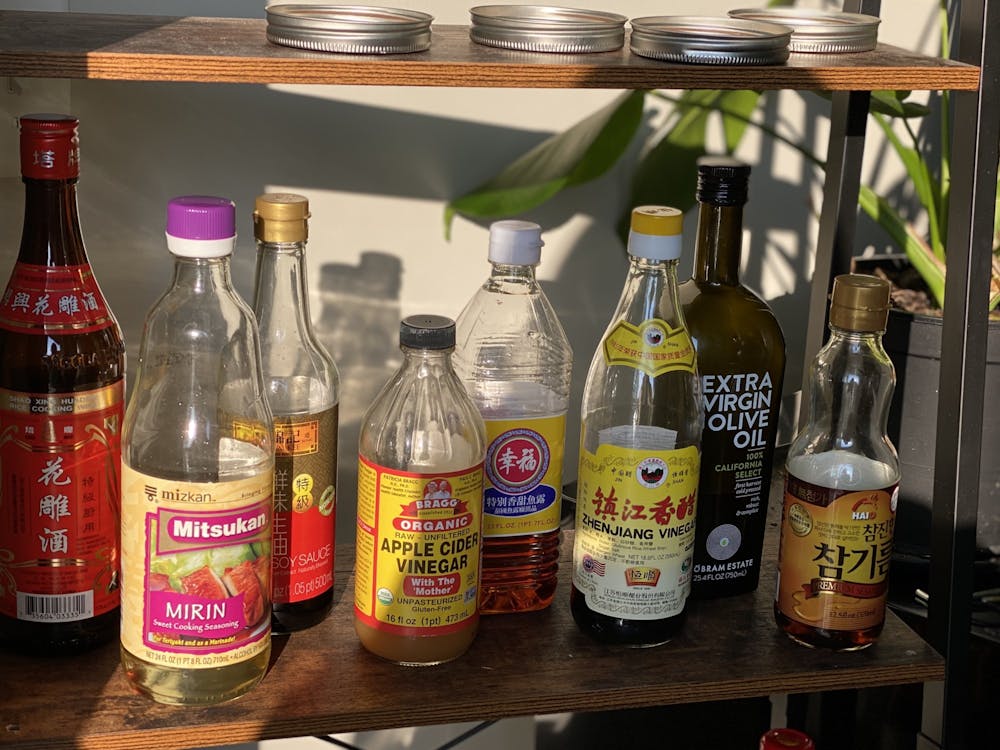Starting a kitchen is a lot like building a home - you start with the foundations, build a basic structure, (stress about the perfect shade of green for your couches) and finish with the decorative touches. When I returned to Durham from abroad as a cliché last spring, glowing from the Australian sun that ‘changed’ me, I had the chance to build a kitchen space that for the first time in over a decade of co-living in various dorms I could call my own. My flatmate at the time, who had moved in a few days prior, had neatly sorted her kitchen essentials into the empty drawers and cabinets. Her kitchen cabinet foundations were a giant bottle of extra virgin olive oil, a large jar of oregano and a tub of tahini — she’s from Greece, if you couldn’t tell. As I slotted in my bottles of soy sauce, mirin and sesame oil, my flatmate remarked on the cross-cultural fusion that the space had become. I loved that our kitchen cabinet had echoes of our respective homes which would translate into tubs of homemade hummus and bowls of noodle soup that we could share with each other.
In the process of building up my kitchen, my three-bottle collection has now expanded into an amalgamation of various spices from anise to white pepper, tubs of miso and doubanjiang, bottles of oyster sauce and yuzu ponzu (I’ve also experimented to varying levels of success with the great American product Velveeta) — I’m aware this means I probably consume too much sodium. High blood pressure risk aside, my kitchen cabinets slowly became reflections of my mother’s in Japan and my grandmother’s at home in Hong Kong. When I make soup noodles and my apartment is saturated with the smell of anise, five-spice, ginger and garlic (come visit for a fantastic olfactory experience) for a few days, suddenly, home doesn’t feel 8,000 miles away.

I remember feeling this distance acutely as a freshman: not when I had pulled up to 2 Epworth Dorm Lane (rest in peace Epworth, gone but never forgotten), alone in an Uber, suitcase whisked away by an exhausted FAC, but when, in an attempt to meet some hallmates, I suggested a trip to my first ever Walmart. One of my favourite things to do whenever I get the chance to travel is to spend a small amount of time perusing the local supermarket, but nothing could have prepared me for the novelty of experiencing American consumerist culture for the first time. Up until that point in my life, it had never occurred to me that something as mundane as toothpaste warranted an entire aisle. There’s something rather exciting about entering an ordinary, familiar place like the grocery store to have shelves stacked with a giant assortment of premade desserts for breakfast, gallons of tea in the fridge of all places and to have everything quite a bit bigger than you’re used to – Walmart is truly an anthropological treasure trove of American culture. I had arrived in a place that I couldn’t quite call home just yet.
This feeling of unfamiliarity and distance between the self and the space you occupy is one I often feel at the start of the school year. It always feels a little like being dropped onto a treadmill that’s already going and you realise firstly that you haven’t quite found your balance yet and secondly that you still absolutely despise running. There’s also a global pandemic raging on. But just like building a kitchen, you start with the basics, finish with the flourishes and in between all of that you take the time to share meals and memories with friends and strangers who become friends.
I’ve spent the last three years of my time at Duke lurking through the pages of The Chronicle, reading about the myriad of wonderful, unique and insightful experiences of our community. I’m inviting you all to join me in my final year in this time of unprecedented frequency of the word “unprecedented” as I share my experiences, musings and exploration of food.
I write this from a position of extreme privilege, as I have never known what it is to be food insecure. As the pandemic rages on, entire communities—families, small-businesses, chefs, farmers, many of whom are undocumented—are increasingly at risk of being swallowed up by circumstances beyond their control and forgotten by systems not designed to serve them. While food has been a continual source of comfort and joy through my experiences of isolation, for many it represents the anxieties of scarcity, of being bound to jobs that prioritize profits over wellbeing. The fabric that food cultures are woven from carries a legacy that is as beautiful as it is bloody, as healing as it is broken and I hope this serves as a celebration but also as a challenge: for us to rethink what and how we eat, who we eat with and why we eat what we do.
Please consider making a food donation or an online donation to the Food Bank of Central & Eastern North Carolina if you are able to — I have made a $35 donation and would really love for you to match me in any amount.
Hannah Homma Tong is a Trinity senior. Her column runs on alternate Thursdays.
Get The Chronicle straight to your inbox
Signup for our weekly newsletter. Cancel at any time.

